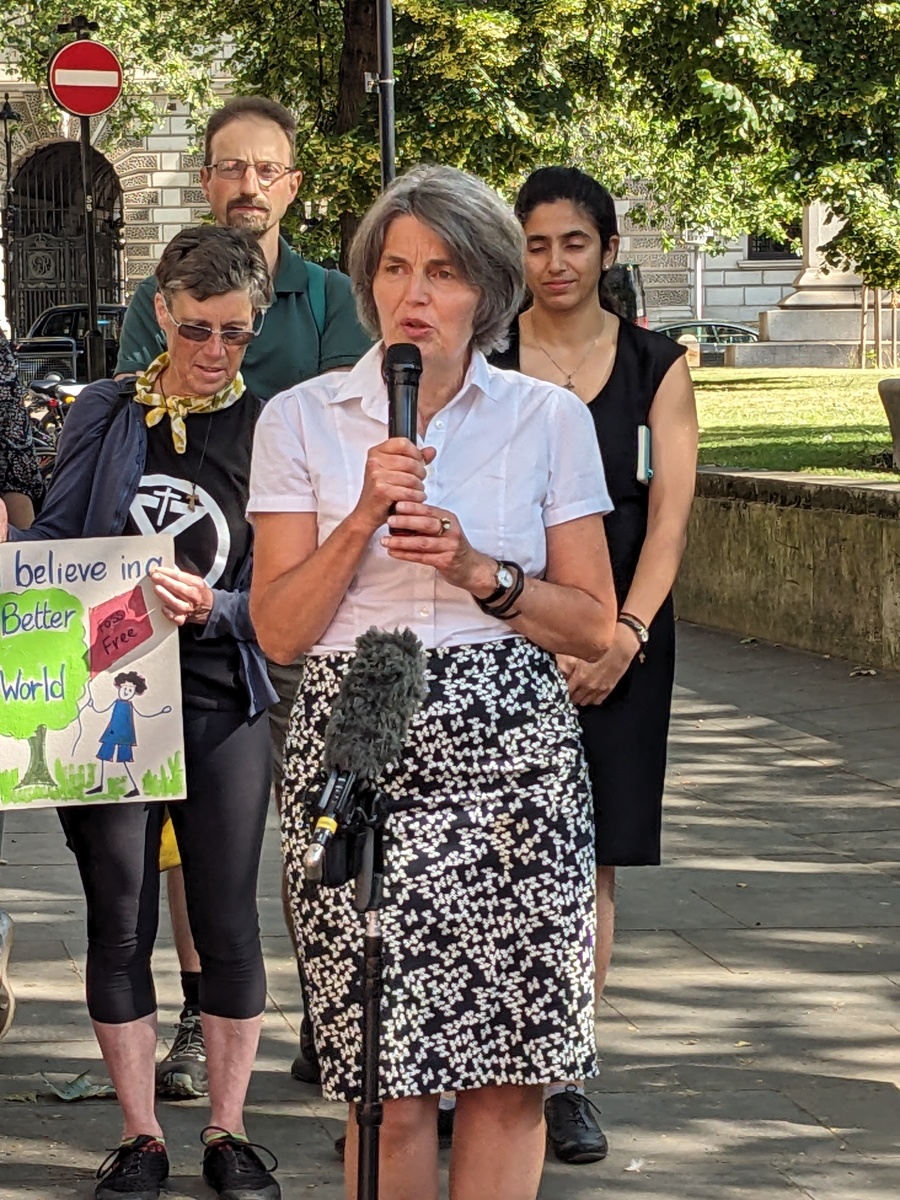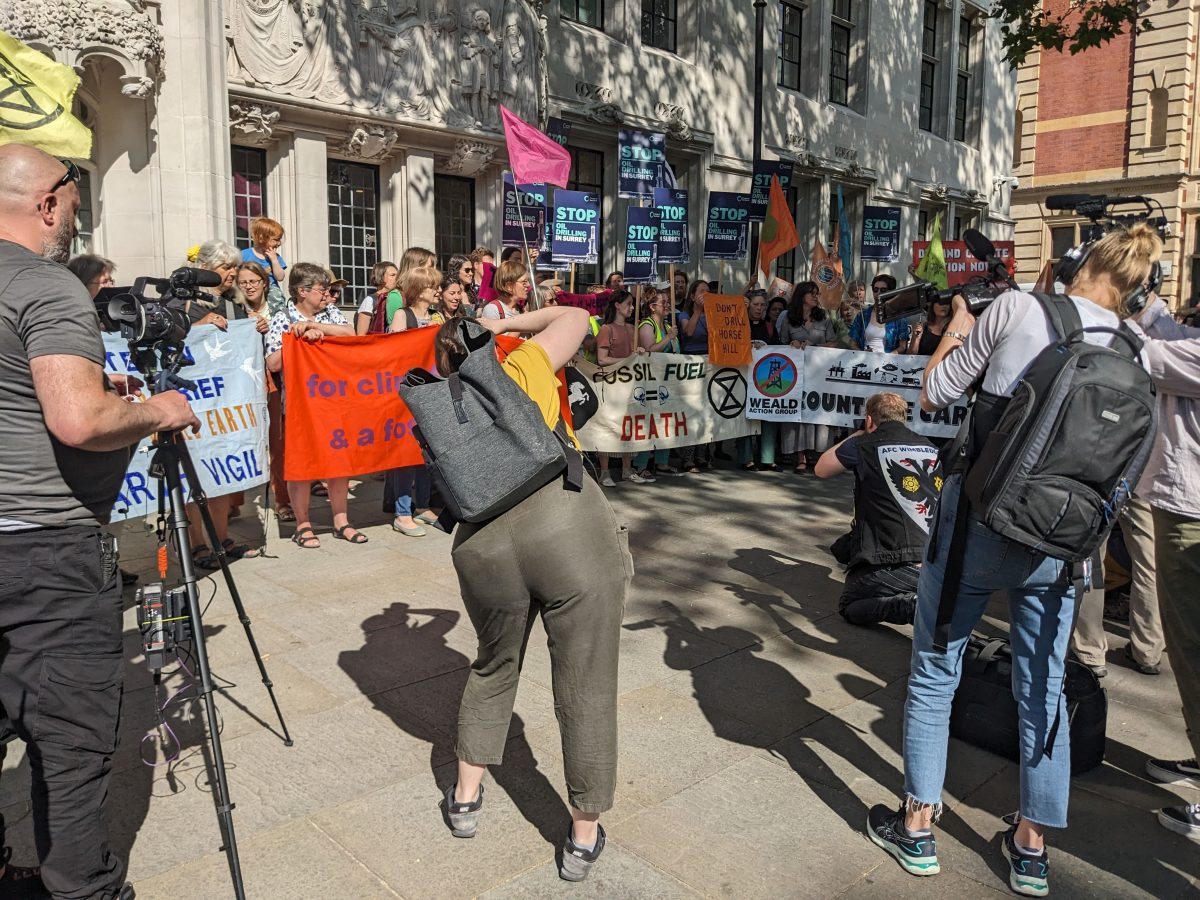Opponents of oil production at the Horse Hill oil site in Surrey gathered outside the Supreme Court this morning for the start of a legal challenge that will have major implications for new fossil fuel projects.

The case, brought by campaigner, Sarah Finch, seeks to overturn a ruling at the Court of Appeal that Surrey County Council acted lawfully when it granted planning permission for oil production at Horse Hill.
Ms Finch argues that the council should have taken account of the climate impact of burning the oil. The council has argued that it needed to consider only the greenhouse gas emissions from the production process.
If the case succeeds, it could challenge whether the government was right to approve the new Cumbrian coal mine, which did not assess the emissions from burning coal.
Ms Finch, who brought the case on behalf of Weald Action Group, told supporters outside the court:
“Fossil fuels are like cigarettes – the biggest impact is when you burn them”.
She said:
“This is all our case. I am not the woman of the moment. This is the case of the moment. The fossil fuel industry is dying. If we win this case, we will all have made a small contribution to that.”

Katie de Kauwe, lawyer for Friends of the Earth which is supporting the case, said described it as David versus Golliath. Weald Action Group was opposed by Surrey County Council, Horse Hill Developments Limited (HHDL) and the department of levelling up, housing and communities, she said:
“We believe in the case that Weald Action Group is taking. We support you. We think you can win.
“This is your moment. You are on the right side of history.”

HHDL’s owner, UK Oil & Gas plc, said in a statement this morning:
“As five judges and the Court of Appeal have previously dismissed Finch et al’s case, the Company and its legal counsel remain convinced that planning consent was granted entirely lawfully, and will, therefore, strongly contest this final action against its interests.
“Planning consent remains in force and lawful production continues at the Horse Hill site in which the Company holds an 85.635% interest.”
All photos by DrillOrDrop
Reporting from this case has been made possible by donations from DrillOrDrop readers










But at least if we produce our own oil from onshore wells we do not increase the carbon footprint by having to import oil.
[Typo corrected at poster’s request]
Your simplistic analysis does not stand up to scrutiny. Why do you think that the O&G lobby consistently talk of NET imports? In the past decade, despite falling production around 70% of UK produced oil has consistently been exported. Some will go via pipeline to e.g. the Netherlands, to return as refined product, but millions of tonnes are shipped using highly polluting bunker fuel to destinations such as China & the US, further increasing the climate impact of said oil.
It does stand up to scrutiny Dennis and you have made the same statement several times before and someone has kindly informed you regarding the reality. [Edited by moderator]
The reality is that the UK is producing more than national demand of the type of oil in question, the excess being a marketable commodity which is shipped worldwide. If this was an issue of national energy security, then why are those wells not restricted to meet said demand and conserve national assets? As with fracking, the security of supply argument is disingenuous given that as stated, the industry is only concerned with ‘net’ imports, Ineos admitted that they would be willing to export UK shale gas whilst at the same time Rough was closed (following the cancellation of Baird & Deborah conversions) in the interest of industry profits.
What is your issue with exports, Dennis? You sound like someone with a vested interest in importing stuff.
I think you might find that adding more cost to local production would decrease local production. Maybe your end point you desire, but why not be honest about it? Then, you might appreciate the downsides to what you desire.
By the way, INEOS has built ships to transport shale gas across the Atlantic to UK and Holland. Seems to me looking at an Atlas that Holland is much closer to UK than USA. Maybe even near enough for a pipeline to prevent the costly process of converting to LNG and back again. Subject to a UK Windfall Tax, even if exported, whereas the imported stuff, not so. How much crowd funding required to plug that gap, Dennis?
If the ridiculous situation continues where only the environmental impacts of getting fossil fuels out of the ground is taken into account, rather than the long term impact of the fuels extracted – then it just goes to show yet again – that planning law is an ass. The government could and should have changed laws and policy years ago to align with the Paris Accord and Net Zero.
No doubt even if this case fails on legal constraints it will at the very least expose the state of the planning system mismatch and the hypocrisy of the government.
Sorry, KatT but you let emotion get in the way of reality. Please explain how much would be allowed under the planning system if what this action requires was successful? It is impossible to ring fence one item within the law-besides which Net Zero still requires oil and gas to be used.